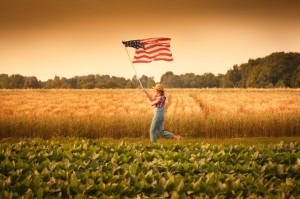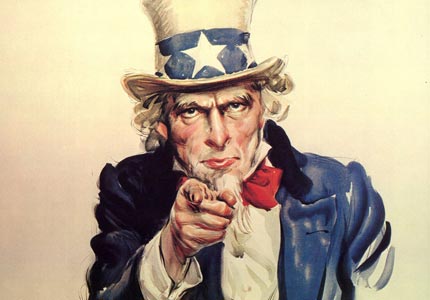 I frequently get asked something along the lines of, “Oliver, you talk a lot about freedom; but what, exactly, do you mean by the word ‘freedom?’ How do you define it?”
I frequently get asked something along the lines of, “Oliver, you talk a lot about freedom; but what, exactly, do you mean by the word ‘freedom?’ How do you define it?”
It’s a very good question. To answer it, I first want to define “liberty.” After all, the Declaration of Independence boldly affirms that among our inalienable rights are “life, liberty, and the pursuit of happiness.”
Actually, the key word in this sentence is “inalienable,” and everyone should read this excellent article by Kyle Roberts on what this word really means.
Liberty and freedom are similar, but they are slightly distinct, and understanding them both is essential in a society that is losing its freedoms.
Liberty
As for “liberty,” I define it as “the right to do whatever a person wants as long as it doesn’t violate the inalienable rights of anyone else.”
Of course, in order to exercise liberty, a person needs to know what inalienable rights are — otherwise, he won’t know whether or not he is violating them.
Thus knowledge and wisdom are required to maintain one’s liberty, because a person who violates somebody else’s inalienable rights naturally forfeits his own liberty. The extent of this forfeiture is equivalent to the depth of the violation — when this is applied well, it is called justice.
License
License, as opposed to liberty, is defined as “the prerogative to do whatever a person wants or is able to do.”
Note that this has often been used in history as an excuse to plunder, force or otherwise violate the rights of others. Thus license and tyranny are nearly always connected — the tyrant is tyrannical precisely because he takes license as he wills, and the person who pursues license eventually exerts tyranny of some kind.
Sometimes people pick one of the inalienable rights and use it to define “liberty,” such as: “Liberty is the right to do whatever a person wants as long as it doesn’t violate the property of another. Or … the life of another, etc. The problem with this type of definition is that though it is often accurate, it is also too limited. The violation of any inalienable right takes away one’s liberty.
Now that we have a definition of “liberty,” we can also define and compare the meaning of “freedom”:
Liberty: The right to do whatever a person wants as long as it doesn’t violate the inalienable rights of anyone else.
Freedom: A societal arrangement that guarantees the right of each person to do whatever he/she wants as long as it doesn’t violate the inalienable rights of anyone else.
“Liberty” comes from the Latin root liber though the French liberte, meaning “free will, freedom to do as one chooses…absence of restraint” (Online Etymology Dictionary).
In contrast, the word “freedom” was rooted in the Old English freodom, which meant “state of free will; charter, emancipation, deliverance.”
Thus liberty could exist with or also without government, but freedom was usually a widespread societal system that required some authority to maintain it.
In most eras of history, the goal is liberty, but it is almost never maintained without freedom. In other words, it is possible to have liberty without freedom, but in such cases it seldom lasts very long and it is usually only enjoyed by a limited few.
When freedom is present, however, liberty exists for all who don’t violate the inalienable rights of others.
What About Now?
This trip down memory lane has an important current application. A lot of people want liberty; in fact, nearly everyone desires liberty. But the only duty of liberty is to honor the inalienable rights of everyone else, and as a result liberty without freedom is fleeting.
In contrast, freedom requires many more duties, and therefore it musters much more from its people. It only succeeds when the large majority of people in a society voluntarily fulfill many duties that keep the whole civilization free.
To repeat: those who stand for freedom must honor the inalienable rights of all, and they must also take responsibility for standing up and helping ensure that society succeeds. No truly free government directs this free and voluntary behavior, but without it freedom decreases.
For example, one of the duties of those who support freedom is free enterprise — to take action that improves the society and makes it better.
No government should penalize a person who does not do this (such penalties would reduce freedom), but overall freedom will decrease if a person has the potential to take great enterprises that improve the world, but doesn’t.
Thus freedom is very demanding. If people don’t voluntarily do good things, and great things, freedom declines. If they don’t exert their will and take risks to improve the world, freedom stagnates and decreases.
Freedom and Morality
Another way that people voluntarily increase freedom is by choosing morality. In societies where a lot of the people don’t choose a moral life, liberty may be maintained by some people but the freedom of all people eventually declines. When more people choose the path of virtuous living, freedom grows.
The same is true of charity and service. When more people choose it, freedom increases. There are a number of other ways people can voluntarily take actions that have a direct and positive impact on freedom. In the freest societies, a lot of the people choose to engage in many such behaviors.
When we pledge allegiance to the flag, we do so to promote “liberty and justice for all.” This is the role of government — liberty and justice, or in other words the protection of inalienable rights and the providing of recompense if such rights are violated.
 But while in free nations government is limited to this role, the people in a free society must do much more. If they all do their best, fully living up to their potential, freedom greatly increases.
But while in free nations government is limited to this role, the people in a free society must do much more. If they all do their best, fully living up to their potential, freedom greatly increases.
In other words, the real question isn’t “What is freedom?” but rather “What is my role in freedom?”
The answer is different for each person, but the key is to not worry about how other people use their freedom. As long as they aren’t violating inalienable rights, they won’t hurt you.
Your focus (and my focus, and each individual’s focus) should be, simply, “Am I living up to my full potential, my great life mission and purpose in this world?”
If your answer to this question is “yes,” you are a promoter of freedom and your efforts and projects will help increase freedom for everyone.
If not, now is the time to get started…






Oliver, I thank you so much for this clarification of freedom and liberty! I especially appreciate the connection between those two words and my duties! I really do want to understand more of all of this and do a better job at fulfilling my duties. I love these thoughts; they challenge me.
You said, “…freedom was usually a widespread societal system that required some authority to maintain it.” I do not mean to be nit-picky, but I am wondering who the authority is or should be? And you said,
“No truly free government directs this free and voluntary behavior, but without it freedom decreases.” What is a truly free government? Do you mean free society? That would fit your article above, it seems to me. I just wanted to know if I was understanding you correctly. Thanks.